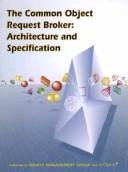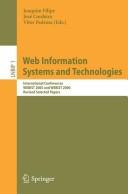| Listing 1 - 8 of 8 |
Sort by
|

ISBN: 0471587923 9780471587927 0894354612 9780894354618 Year: 1992 Publisher: New York John Wiley
Abstract | Keywords | Export | Availability | Bookmark
 Loading...
Loading...Choose an application
- Reference Manager
- EndNote
- RefWorks (Direct export to RefWorks)
Book
Year: 2005 Publisher: Berlin ; New York : Springer,
Abstract | Keywords | Export | Availability | Bookmark
 Loading...
Loading...Choose an application
- Reference Manager
- EndNote
- RefWorks (Direct export to RefWorks)
Model-Driven Architecture (MDA) is an initiative proposedby the Object M- agement Group (OMG) for platform-generic software development. MDA s- arates the speci?cation of system functionality from the implementation on a speci?c platform. It is aimed at making software assets more resilient to changes caused by emerging technologies. While stressing the importance of modeling, the MDA initiative covers a wide spectrum of research areas. Further e?orts are required to bring them into a coherent approach based on open standards and supported by matured tools and techniques. Thisvolumecontainstheselectedpapersoftwoworkshopson“Model-Driven Architecture – Foundations and Applications” (MDAFA): MDAFA 2003 held at the University of Twente, Twente, The Netherlands, June 26–27, 2003, and MDAFA 2004 held at Linko ¨ping University, Link¨ oping, Sweden, June 10–11, 2004. The goal of the workshops was to understand the foundations of MDA, to share experience in applying MDA techniques and tools, and to outline future research directions. The workshops organizers encouraged authors of accepted papers to re-submit their papers to a post-workshop reviewing process; 15 of these papers were accepted to appear in this volume on MDA.
Architecture, Computer. --- Computer organization. --- Software engineering. --- Computer logic. --- Management information systems. --- Computer science. --- Computer System Implementation. --- Computer Systems Organization and Communication Networks. --- Software Engineering. --- Logics and Meanings of Programs. --- Management of Computing and Information Systems. --- Object-oriented programming (Computer science) --- Model-driven software architecture
Book
Year: 2005 Publisher: Berlin ; New York : Springer,
Abstract | Keywords | Export | Availability | Bookmark
 Loading...
Loading...Choose an application
- Reference Manager
- EndNote
- RefWorks (Direct export to RefWorks)
Model-Driven Architecture (MDA) is an initiative proposedby the Object M- agement Group (OMG) for platform-generic software development. MDA s- arates the speci?cation of system functionality from the implementation on a speci?c platform. It is aimed at making software assets more resilient to changes caused by emerging technologies. While stressing the importance of modeling, the MDA initiative covers a wide spectrum of research areas. Further e?orts are required to bring them into a coherent approach based on open standards and supported by matured tools and techniques. Thisvolumecontainstheselectedpapersoftwoworkshopson“Model-Driven Architecture – Foundations and Applications” (MDAFA): MDAFA 2003 held at the University of Twente, Twente, The Netherlands, June 26–27, 2003, and MDAFA 2004 held at Linko ¨ping University, Link¨ oping, Sweden, June 10–11, 2004. The goal of the workshops was to understand the foundations of MDA, to share experience in applying MDA techniques and tools, and to outline future research directions. The workshops organizers encouraged authors of accepted papers to re-submit their papers to a post-workshop reviewing process; 15 of these papers were accepted to appear in this volume on MDA.
Architecture, Computer. --- Computer organization. --- Software engineering. --- Computer logic. --- Management information systems. --- Computer science. --- Computer System Implementation. --- Computer Systems Organization and Communication Networks. --- Software Engineering. --- Logics and Meanings of Programs. --- Management of Computing and Information Systems. --- Object-oriented programming (Computer science) --- Model-driven software architecture
Book
Year: 2005 Publisher: Berlin ; New York : Springer,
Abstract | Keywords | Export | Availability | Bookmark
 Loading...
Loading...Choose an application
- Reference Manager
- EndNote
- RefWorks (Direct export to RefWorks)
Model-Driven Architecture (MDA) is an initiative proposedby the Object M- agement Group (OMG) for platform-generic software development. MDA s- arates the speci?cation of system functionality from the implementation on a speci?c platform. It is aimed at making software assets more resilient to changes caused by emerging technologies. While stressing the importance of modeling, the MDA initiative covers a wide spectrum of research areas. Further e?orts are required to bring them into a coherent approach based on open standards and supported by matured tools and techniques. Thisvolumecontainstheselectedpapersoftwoworkshopson“Model-Driven Architecture – Foundations and Applications” (MDAFA): MDAFA 2003 held at the University of Twente, Twente, The Netherlands, June 26–27, 2003, and MDAFA 2004 held at Linko ¨ping University, Link¨ oping, Sweden, June 10–11, 2004. The goal of the workshops was to understand the foundations of MDA, to share experience in applying MDA techniques and tools, and to outline future research directions. The workshops organizers encouraged authors of accepted papers to re-submit their papers to a post-workshop reviewing process; 15 of these papers were accepted to appear in this volume on MDA.
Architecture, Computer. --- Computer organization. --- Software engineering. --- Computer logic. --- Management information systems. --- Computer science. --- Computer System Implementation. --- Computer Systems Organization and Communication Networks. --- Software Engineering. --- Logics and Meanings of Programs. --- Management of Computing and Information Systems. --- Object-oriented programming (Computer science) --- Model-driven software architecture


ISBN: 1280969806 9786610969807 3540740635 3540740627 Year: 2007 Publisher: Berlin ; Heidelberg : Springer,
Abstract | Keywords | Export | Availability | Bookmark
 Loading...
Loading...Choose an application
- Reference Manager
- EndNote
- RefWorks (Direct export to RefWorks)
This book constitutes the thoroughly refereed post-proceedings of the 1st and 2nd International Conference on Web Information Systems and Technologies, WEBIST 2005 and 2006, held in Miami, FL, USA, and Setubal, Portugal, respectively. The 30 revised full papers presented in this volume were carefully reviewed and selected from more than 300 submissions overall. In addition, three keynote presentations are also included. The papers address all relevant aspects of web information systems technologies and applications and are grouped into four parts about internet technology; web interfaces and applications; society, e-business and e-government; and e-learning.
Information technology --- World Wide Web --- Web services --- Business mathematics. --- Information theory. --- Information technology. --- Computer science. --- e-Commerce/e-business. --- Business Mathematics. --- Theory of Computation. --- IT in Business. --- Information Systems Applications (incl. Internet). --- Computer Applications. --- Informatics --- Science --- Communication theory --- Communication --- Cybernetics --- IT (Information technology) --- Technology --- Telematics --- Information superhighway --- Knowledge management --- Arithmetic, Commercial --- Business --- Business arithmetic --- Business math --- Commercial arithmetic --- Finance --- Mathematics --- E-commerce. --- Computers. --- Business—Data processing. --- Application software. --- Cybercommerce --- E-business --- E-commerce --- E-tailing --- eBusiness --- eCommerce --- Electronic business --- Internet commerce --- Internet retailing --- Online commerce --- Web retailing --- Commerce --- Application computer programs --- Application computer software --- Applications software --- Apps (Computer software) --- Computer software --- Automatic computers --- Automatic data processors --- Computer hardware --- Computing machines (Computers) --- Electronic brains --- Electronic calculating-machines --- Electronic computers --- Hardware, Computer --- Computer systems --- Machine theory --- Calculators --- Cyberspace --- Tecnologia de la informació --- Web --- W3 --- World Wide Web (Sistema de recuperació de la informació) --- WWW --- Internet --- Sistemes multimèdia
Book
ISBN: 0769523471 1538603292 9781538603291 Year: 2005 Publisher: [Place of publication not identified] IEEE Computer Society
Abstract | Keywords | Export | Availability | Bookmark
 Loading...
Loading...Choose an application
- Reference Manager
- EndNote
- RefWorks (Direct export to RefWorks)
Book
Year: 2002 Publisher: [Place of publication not identified] IEEE Computer Society
Abstract | Keywords | Export | Availability | Bookmark
 Loading...
Loading...Choose an application
- Reference Manager
- EndNote
- RefWorks (Direct export to RefWorks)
Book
Year: 2002 Publisher: [Place of publication not identified] IEEE Computer Society
Abstract | Keywords | Export | Availability | Bookmark
 Loading...
Loading...Choose an application
- Reference Manager
- EndNote
- RefWorks (Direct export to RefWorks)
| Listing 1 - 8 of 8 |
Sort by
|

 Search
Search Feedback
Feedback About UniCat
About UniCat  Help
Help News
News